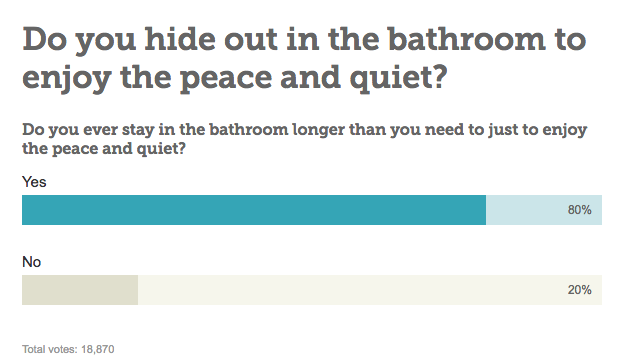The Groom of the Stool

The poll result above comes from parenting website BabyCenter. It’s not a scientific poll — few such online polls are — but the results are still pretty striking. Of the over 18,000 people who responded, a resounding 80% admitted that they’ve hidden in the bathroom just to catch a moment of peace. (And the other 20% are lying.) It makes sense — the bathroom is a private, solitary place; it’s somewhere where you go by yourself.
But that wasn’t always the case. Or, at least, it wasn’t if you were the king of England.
Henry VII grabbed the British throne in 1485, centuries before modern plumbing or for that matter, toilet paper (check out the bonus fact). As a result, going #2 wasn’t the most convenient of experiences. And the King of England, well, he can’t be inconvenienced by bodily functions. So he needed help — in the form of an attendant.
It wasn’t as bad as you think. But it was close.
The royal toilet helper was given a title: “the Groom of the Stool.” The “groom” part referenced the grooming aspect of the job (think horse groomer, not bridegroom). The “stool” was a reference to a “close stool” (and not poop), which was basically a portable chair with a chamber pot under the seat (and, thankfully, a lid). Effectively, the Groom of the Stool’s job was to help the monarch undress and then clean up after the king did his business. According to Historic UK, “there are no historical records to suggest that the Groom [. . . ] actually cleansed the royal posterior himself,” but still — it’s not a job for everyone.
And yet, this job wasn’t all backsides — it also had its upside. (Sorry, I couldn’t resist.) As the poll above suggests, the bathroom is a private, intimate place. And that was also true for the UK at the time. As a result, the kings who employed Grooms of the Stool often treated them as their closest of confidants. Wikipedia explains:
The physical intimacy of the role naturally led to him becoming a man in whom much confidence was placed by his royal master and with whom many royal secrets were shared as a matter of course. This secret information—whilst it would never have been revealed, to the discredit of his honor—in turn led to him becoming feared and respected and therefore powerful within the royal court in his own right.
So, if you were willing to take on a dirty job, power awaited on the other side.
But for better or for worse, the Groom of the Stool role is no more. As things like toilets and the like emerged, the need for a bathroom attendant diminished. The office was abolished in 1901.
Bonus fact: Lack of access to water, sanitation, and hygiene is still a problem in lots of areas around the world, and it’s no laughing matter. According to the CDC, “Eighty-eight percent of diarrhea cases worldwide are linked to unsafe water, inadequate sanitation or insufficient hygiene. These cases result in 1.5 million deaths each year, mostly in young children,” typically due to dehydration.
From the Archives: Proto-TP: Another reason why people read on the can? Because before toilet paper was a thing, reading material could serve that purpose.
Related: A potty throne fit for a princess.
